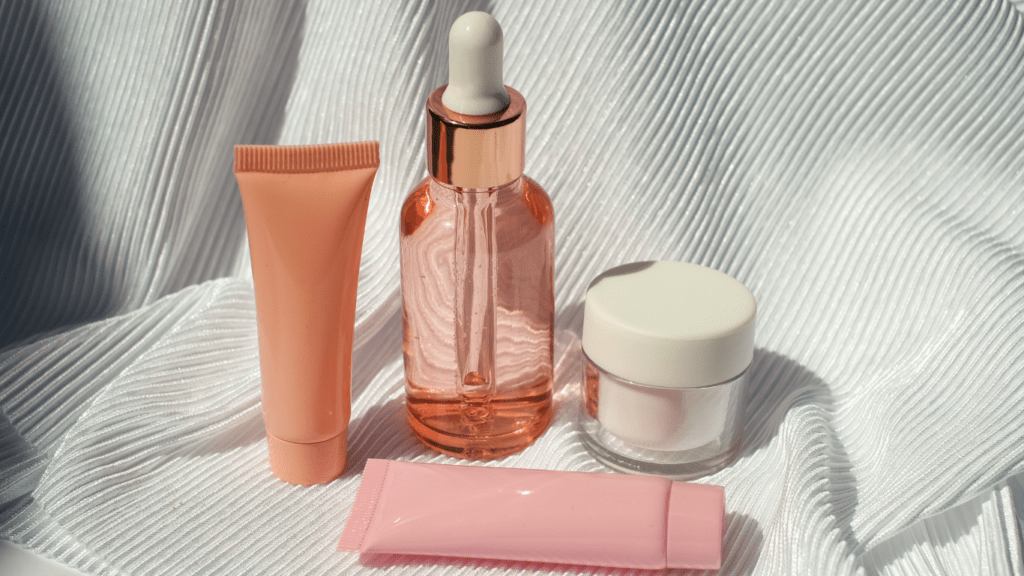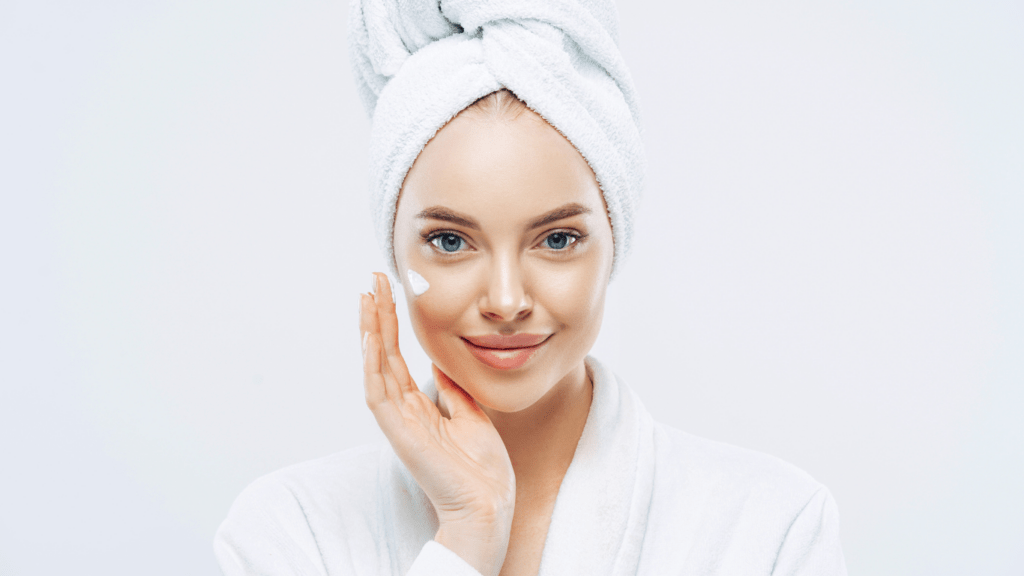Understanding Skincare Basics
Creating a skincare routine starts with understanding three key product types: serums, toners, and moisturizers. Each plays a specific role in maintaining healthy, glowing skin.
- Serums are concentrated formulas designed to target specific skin concerns, such as fine lines, hyperpigmentation, and hydration. Packed with active ingredients like vitamin C, hyaluronic acid, and retinol, serums deliver potent benefits directly to the skin. For example, vitamin C serums brighten the complexion, while hyaluronic acid serums boost moisture levels.
- Toners prepare the skin for the absorption of other products. They balance the skin’s pH level and remove any residual impurities left after cleansing. Toners often contain soothing ingredients like chamomile, witch hazel, or rose water. For instance, witch hazel toners help minimize pores, and rose water toners provide calming effects.
- Moisturizers seal in hydration and create a protective barrier. They come in various formulations, including creams, gels, and lotions, catering to different skin types. Ingredients like ceramides, glycerin, and shea butter ensure skin stays hydrated and soft. For example, glycerin-based moisturizers attract moisture to the skin, while ceramide-based ones strengthen the skin’s barrier.
Understanding these basics helps in selecting products that address your specific skincare needs effectively.
The Role of Serums
Serums play a crucial role in any skincare routine. These concentrated formulations target specific skin issues using potent active ingredients.
Types of Serums
Serums cater to various skin concerns, with each type containing specific active ingredients for different purposes.
- Anti-Aging Serums: These often include retinol and peptides to reduce fine lines and wrinkles.
- Hydrating Serums: Ingredients like hyaluronic acid and glycerin boost moisture levels.
- Brightening Serums: Vitamin C and niacinamide help to improve skin tone and reduce pigmentation.
- Exfoliating Serums: Acids like alpha hydroxy acids (AHAs) and beta hydroxy acids (BHAs) promote cell turnover.
- Calming Serums: Contain ingredients such as chamomile and calendula to soothe irritation.
Choosing the Right Serum For Your Skin
Selecting the right serum depends on individual skin needs and goals.
- Identify Skin Concerns: Determine whether the main issue is aging, dryness, dullness, acne, or sensitivity.
- Check Ingredients: For wrinkles, retinol works best; for dryness, opt for hyaluronic acid; for uneven skin tone, consider vitamin C.
- Patch Test: Before full application, perform a patch test to check for any adverse reactions.
- Consult a Dermatologist: Get professional advice if unsure, especially for serious concerns like acne or rosacea.
Understanding the role of serums helps integrate them effectively into your skincare routine, addressing specific needs with precision.
The Importance of Toners
Toners play a crucial role in creating an effective skincare routine. They prepare the skin for better absorption of serums and moisturizers, enhancing the efficacy of these products.
Benefits of Using Toners
Toners balance the skin’s pH levels, keeping it healthy and less prone to irritation. They also help remove residual impurities left after cleansing, ensuring a cleaner surface.
- Balancing pH Levels: Skin’s natural pH can get disrupted by cleansers; toners restore it.
- Removing Impurities: Any leftover dirt or makeup gets eliminated, reducing clogged pores.
- Refreshing the Skin: Toners often contain soothing ingredients, which can calm inflammation or redness.
Selecting a Toner Based on Skin Type
Different skin types require specific toner formulations to address unique concerns.
- Oily Skin: Choose toners with salicylic acid or witch hazel to control oil and minimize pores.
- Dry Skin: Opt for hydrating toners containing hyaluronic acid or glycerin to retain moisture.
- Combination Skin: Use balancing toners with both hydrating and oil-controlling properties.
- Sensitive Skin: Look for alcohol-free toners with soothing ingredients like aloe vera or chamomile.
Moisturizers for Every Skin Type

Selecting the right moisturizer is crucial for retaining skin’s hydration and providing a protective barrier. Different skin types require specific formulations for optimal results.
Key Ingredients to Look For
Hydration and protection depend on the right ingredients.
- Hyaluronic Acid: Ideal for all skin types; this ingredient attracts moisture to keep skin plump.
- Ceramides: Strengthen the skin barrier, beneficial for dry and sensitive skin, preserving moisture.
- Glycerin: Helps skin retain moisture, effective for dry skin.
- Niacinamide: Balances oil production, suitable for combination and oily skin, and soothes redness.
- Squalane: Mimics natural skin oils; non-comedogenic, beneficial for all skin types, especially for dry and sensitive skin.
- Peptides: Promote skin repair and collagen production, advantageous for aging skin.
How to Choose the Best Moisturizer
The perfect moisturizer aligns with your skin’s unique needs.
- Dry Skin: Choose creams or balms with ceramides, glycerin, and hyaluronic acid for deep hydration. Examples include CeraVe Moisturizing Cream or Eucerin Advanced Repair Cream.
- Oily Skin: Opt for lightweight, non-comedogenic gels or lotions with niacinamide or hyaluronic acid to balance moisture and oil. Products like Neutrogena Hydro Boost Water Gel or La Roche-Posay Effaclar Mat are good choices.
- Combination Skin: Look for balanced formulations that hydrate dry areas and control oil in the T-zone. Try Belif The True Cream Aqua Bomb or Clinique Dramatically Different Moisturizing Gel.
- Sensitive Skin: Select fragrance-free, hypoallergenic options with soothing ingredients like aloe vera or chamomile. Vanicream Moisturizing Cream or Aveeno Ultra-Calming Nourishing Night Cream fit well here.
- Normal Skin: Use any moisturizer that maintains hydration without overloading with oils. Kiehl’s Ultra Facial Cream or Olay Regenerist Micro-Sculpting Cream work effectively.
Match your moisturizer to your skin’s needs for optimal results and lasting hydration.
Building Your Skincare Routine
Creating a tailored skincare routine ensures your skin gets the targeted care it needs. A thoughtful approach, using specific products at the right times, can enhance your skin’s health.
Morning Routine Essentials
A morning routine preps your skin for the day ahead, focusing on protection and hydration.
- Cleanser: Start by cleansing to remove any overnight oils and impurities. Look for gentle, sulfate-free cleansers.
- Toner: Apply a toner to balance your skin’s pH. Choose ingredients like witch hazel for oily skin or glycerin for dry skin.
- Serum: Use a vitamin C serum to combat free radicals and brighten your complexion.
- Moisturizer: Hydrate your skin with a lightweight, non-comedogenic moisturizer. Hyaluronic acid and ceramides are good choices.
- Sunscreen: Finish your routine with a broad-spectrum SPF 30 or higher. This step protects against UV damage.
Night Routine Essentials
A night routine focuses on repair and replenishment, giving your skin what it needs to recover.
- Makeup Remover/Cleanser: Remove makeup with a dedicated remover, then cleanse to ensure all impurities are off. Oil-based cleansers work well for this step.
- Toner: Reapply your toner to prepare your skin for better absorption of subsequent products.
- Serum: Opt for active ingredients like retinol or glycolic acid to promote cell turnover and collagen production.
- Moisturizer/Night Cream: Use a richer moisturizer to lock in hydration. Ingredients like peptides and squalane can aid in skin repair.
- Eye Cream: Apply an eye cream with ingredients like caffeine or hyaluronic acid to target puffiness and fine lines.
Optimizing your skincare routine with these steps helps address specific skin concerns effectively.





